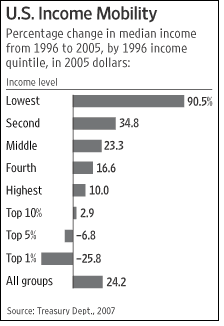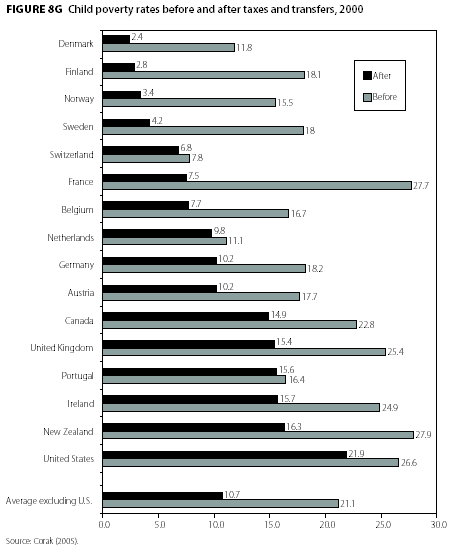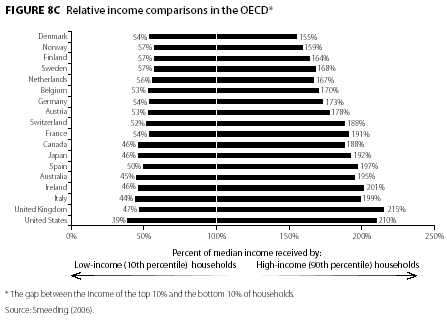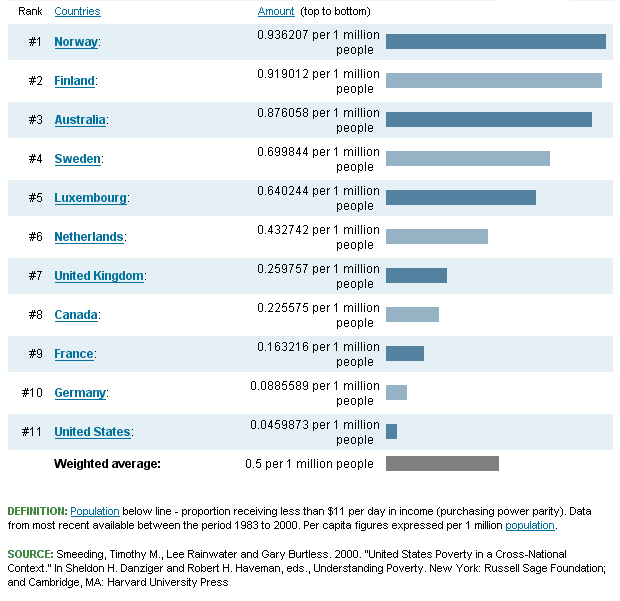Under
mounting pressure from climate catastrophists to ignore uncertainties
in the science and to produce definitive statements that can be used as
calls for government interventionism, the UN will apparently release a new "warning" this week:
Global
warming is destroying species, raising sea levels and threatening
millions of poor people, the United Nations' top scientific panel will
say in a report today that U.N. officials hope will help mobilize the
world to take tougher actions on climate change.
The report
argues that only firm action, including putting a price on
carbon-dioxide emissions, will avoid more catastrophic events.
Those
actions will take a small part of the world's economic growth and will
be substantially less than the costs of doing nothing, the report says.
For the first time, the UN is trying to
argue explicitly that the cost of CO2 abatement is lower than the cost
of doing nothing. They are arguing that a cooler but poorer world is
superior to a warmer and richer world. I am glad they are finally
arguing this point. Because while we can argue about the truth of how
much the world has warmed and how much is due to man, the UN is DEAD
WRONG on this point. The cost of aggressive CO2 abatement is far, far
higher than the cost of doing nothing.
The report presumably will be released by UN Secretary-General Ban Ki Moon, who demonstrated his stunning ignorance of climate science, geology, and geography on a recent climate-junket to Antarctica. Let's take it line by line.
Is man destroying or threatening species? Absolutely. Is this threat from CO2 and warming? No, and I have read every inch of the UN IPCC report and you can find no evidence for this proposition.
But saying this rallies the environmental base (the hard core
environmentalists don't really care about poor people, at least when
their interests conflict with animals). Most of the evidence is that
species thrive in warmer weather, and polar bears have survived several
inter-glaciation periods where the north pole melted entirely in the
summer.
Are sea levels rising? Yes. In fact, they have been
rising for at least 150 years, and in fact have been rising steadily
and at roughly the same rate since the last ice age. We have seen
absolutely no acceleration of the underlying sea level rise trend.
Further, the UN's IPCC does have a forecast for sea level rise over the
next century. Even using temperature forecasts I consider exaggerated,
the UN does not forecast more than about a foot of sea level rise over
the coming century, only a bit more than what the sea level has risen
over the last 150 years. This is a great example of the disconnect
between the UN political climate reports and the science underlying
them. The guys writing the summary know that their report says only a
few inches of sea level rise, so they just say it is rising, and then
let the crazies like Al Gore throw around numbers like 20 feet.
Here is an interesting thought: If I say the sea levels
will rise 0" over the next 100 years, the UN will call me out and say I
am wrong. However, when Al Gore said sea levels will rise 20 feet in
his movie An Inconvenient Truth, no one at the UN or the IPCC
called him out, despite the fact that my forecast was only a few inches off from theirs and his was 19 feet off the mark.
And of course, there are the poor. The number one biggest
losers in any effort to abate CO2 emissions will be the poor. In
wealthy countries like the US, the poor will be the hardest hit by $10
or even $20 gas prices that would be necessary to rolling CO2
production back to 1990 levels. In the third world, nearly a billion
people just starting to emerge from poverty will have no chance of doing so if their economies are hamstrung with CO2 limits. The poor will be devastated by aggressive CO2 limits.
Weighed against this economic disaster would be, what?
How would rising world temperatures hurt the poor? Well, its not at
all clear. A foot of sea-level rise is very unlikely to hurt many poor
people, though it might inconvenience a few rich owners of beach-front
luxury homes. Here is a clarifying question I often ask people --
would you rather fifteen Atlantic hurricanes each year, or sixteen
hurricanes each year and Carribbean economies that are twice as rich
and therefore have twice the resources to handle hurricanes. This is
the colder and poorer vs. warmer and richer choice. We see this in Bangladesh today. Why do orders of magnitude more people die in Bangladesh cyclones than class 5 hurricanes on the US shore? Because they are poor, not because of anything having to do with global warming.
It is often claimed that global warming will cause
droughts, but in fact warmer world temperatures will vaporize more
water in the atmosphere and should net increase rain, not drought. And
many of the farmers in the northern hemisphere would enjoy longer
growing seasons and thereby more food production.
Glaciers
and ice caps are melting at a rapid rate; animals and plants are
shifting their range to accommodate warmer air and water; and planting
seasons are changing, the report said.
Yes, land-based ice is melting in the Northern Hemisphere. This is 15% of the world's ice. 85% of the world's ice is in Antarctica, which is increasing.
Seriously. I know you don't believe this if you trust the media, but
the ice that is melting in Greenland is tiny compared to the ice that
is increasing at the South Pole. In fact, the IPCC gets most of its
prjected sea rise from thermal expansion of warmer oceans, not from ice
melting. And don't you love the "planting seasons are changing." That
sounds like its scary, or something, until you recognize the truth is
that planting seasons are changing, becoming longer and more beneficial to food production!
On many occasions, I have discussed the bad science that
goes into these apocalyptic forecasts. But that science is of top
quality compared to the economics that must have gone into the
statement that:
The most
stringent efforts to stabilize greenhouse gases would cost the world's
economies 0.12 percent of their average annual growth to 2050, the
report estimates.
This is absolute, unmitigated crap.
Though I have not seen specifics in this report, the UN's position has
generally been that emissions should be rolled back to 1990 levels (the
target embodied in the Kyoto treaty). Such a target implies reductions
of more than 20% from where we are today and well over 50% from where
we will be in 2050. These are enormous cuts that cannot be achieved
with current technology without massive reductions in economic growth.
The world economy is inextricably tied to the burning of fossil fuels.
And, unlike ancillary emissions like SO2, CO2 emissions cannot be
limited without actually reducing carbon combustion since it is
fundamental to the combustion chemistry. Even supporters of
legislation such as the Bingaman-Specter bill admit that as much as a
trillion dollars will need to be spent to reduce global temperatures
about 0.13C. And that is a trillion for the first tenth of a degree --
the law of diminishing returns means that each additional tenth will
cost more.
Lets look at history as our guide. Most of the European
countries and Japan signed onto the Kyoto Treaty to reduce emissions to
1990 levels. They have taken many expensive steps to do so,
implemented many more controls than in the US, and have gas prices as
much as double those in the US. During the period since 1990, most of
these countries, unlike the US and China and India, have been in a deep
and extended economic recession, which tends to suppress the growth of
fossil fuel consumption. Also, the CO2 numbers for countries like
Russia and Germany benefit greatly from the fall of the old Communist
Block, as their 1990 base year CO2 numbers include many horribly
inefficient and polluting Soviet industries that have since been shut
down. And, given all this, they STILL are going to miss
their numbers. These countries have experienced reductions in economic
growth orders of magnitude greater than this 0.12 percent quoted by the
UN, and that still is not enough to reduce CO2 to target levels. Only
outright contraction of the world's economy is going to suffice [note:
A strong commitment to replacing coal plants with nuclear might be a
partial solution, but it will never happen because the people calling
for CO2 controls are the same ones who shut down our nuclear programs.
Also, technological change is always possible. It would be awesome if
someone found a way to roll out sheets of efficient solar cells like
carpet out of Dalton, Georgia, but that has not happened yet.]
The UN has gotten to such low cost estimates for their
government controls because they have convinced themselves, much like
the promoters of building football stadiums for billionaire team
owners, that they will get a huge return from the government CO2
controls:
"There is high
agreement and much evidence that mitigation actions can result in
near-term co-benefits, for example improved health due to reduced air
pollution, that may offset a substantial fraction of mitigation costs,"
said the report, which summarizes research over five years of more than
2,000 of the world's top climate-change scientists...
The U.N. panel embraced the arguments of British economist
Nicholas Stern, who concluded last year that the cost of taking tough
measures to curb pollution will be repaid in the long run.
Nicholas
Stern? Haven't we heard that name before? Why, yes we have. He is
the man that said that all of the world's climate problems would go
away if we forced all the western economies to look just like India.
Mr
Stern, the former chief economist of the World Bank, sends out a very
clear message: "We need to cut down the total amount of carbon
emissions by half by 2050." At current levels, the per capita global
emissions stand at 7 tonnes, or a total of 40-45 gigatonnes. At this
rate, global temperatures could rise by 2.5-3 degrees by then. But to
reduce the per capita emissions by half in 2050, most countries would
have to be carbon neutral. For instance, the US currently has, at 20-25
tonnes, per capita emissions levels that are three times the global
average.
The European Union's emission levels stand at 10-15
tonnes per capita. China is at about 3-4 tonnes per capita and India,
at 1 tonne per capita, is the only large-sized economy that is below
the desired carbon emission levels of 2050. "India should keep it that way and insist that the rich countries pay their share of the burden in reducing emissions," says Mr Stern.
Which,
by the way, is exactly my point. I very much hope Mr. Stern continues
to make this clear in public. One of the ways catastrophists support
their cause of massive government interventionism is to try to portray
the answer as little cutsie actions, like your 5-year-old helping with
the recycling. This is not what is require to meet these targets.
What is required is ratchet down the US economy until we are all about
as wealthy as the average Indian. I guess that would at least take
care of the outsourcing "problem."
One of the ways that the UN gets away with this is that no
one has the time to read the detailed scientific report, and so
reporters rely on the summaries like these. Unfortunately, the same
people who write the scientific sections are not the people who write
the summaries. Careful language about uncertainties, which are still
huge, in the science are replaced by summaries written by politicians
that say:
The near-final draft,
approved Friday by representatives of more than 140 governments meeting
in Valencia, Spain, said global warming is "unequivocal" and said man's
actions are heading toward "abrupt or irreversible climate changes and
impacts."...
"This will be viewed by all as a definitive report. It is
the blueprint for the Bali talks," said Sen. John Kerry, D-Mass., who
will be at the Indonesian U.N. meeting beginning Dec. 3 as part of a
U.S. senatorial delegation.
Another
technique used by the UN that we see in play here is their willingness
to cherry-pick one author that follows the UN narrative to refute a
whole body of science that is contrary to the narrative. Thus, the UN
latched onto Michael Mann's hockey stick to overturn a consensus that
there was a Medieval warm period, and now they have latched onto
Nicholas Stern to overturn the opinion of, approximately, every other
economist in the world who think CO2 mitigation will be really
expensive.
As always, you are encourage to view my movie What is Normal: A Critique of Catastrophic Man-Made Global Warming Theory or check out my book (free online) called A Skeptical Layman's Guide to Anthropogenic Global Warming.
By the way, in the title I put "new" in quotes. Here is why. I just read a presentation by Dr. Richard Lindzen from 1992 that shows that catastrophists were declaring the debate "over" as early as 1989, before any real research had even been performed:
By early 1989, however, the popular media in Europe and the United States were declaring that "all scientists'' agreed that warming was real and catastrophic in its potential.
...
In the meantime, the global warming circus was in
full swing. Meetings were going on nonstop. One of the more striking of
those meetings was hosted in the summer of 1989 by Robert Redford at
his ranch in Sundance, Utah. Redford proclaimed that it was time to stop research and begin acting.
I suppose that that was a reasonable suggestion for an actor to make,
but it is also indicative of the overall attitude toward science.
Barbara Streisand personally undertook to support the research of
Michael Oppenheimer at the Environmental Defense Fund, although he is
primarily an advocate and not a climatologist. Meryl Streep made an
appeal on public television to stop warming. A bill was even prepared
to guarantee Americans a stable climate




